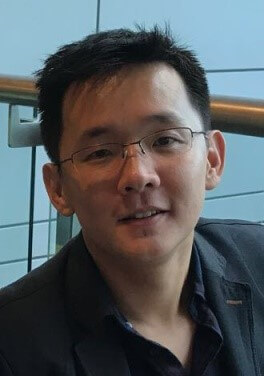COLLOQUIUM 2021
Near-future challenges in scientific analysis for gravitational-wave astronomy
| Speaker | Alvin Chua, TAPIR, California Institute of Technology, Pasadena, CA, USA |
| Host | Anjan Soumyanarayanan |
| Date | Thu, 26 Aug @ 11 AM – 12 PM |
| Zoom registration link | https://nus-sg.zoom.us/meeting/register/tZ0vc-6gpj8oEtUXGsu9ZICLJdd8QKu42478 |
Abstract
Gravitational-wave astronomy is the study of astrophysical phenomena through their gravitational radiation. This new and exciting field was born from the historic first direct detection of gravitational waves by the LIGO detectors in 2015. Our coverage of the gravitational spectrum has since been expanded at high frequencies by a growing network of ground-based interferometers, and at low frequencies by long-duration pulsar-timing-array projects. In the next decade, space interferometers such as the LISA mission will probe the mid-frequency band, where an even richer population of sources radiate.
Complex problems in gravitational-wave astronomy are posed both by the modeling of possible signals from highly relativistic sources, and by the extraction and analysis of actual signals in noise-dominated data. They are exacerbated for space-based observing with LISA, and particularly for the class of source known as extreme-mass-ratio inspirals. In this talk, I will broadly discuss the theory and observation of gravitational waves, the present status of ground-based observing, and the distinctive challenges of LISA science. I will then introduce some of the modern computational and statistical techniques that I have developed to tackle a variety of open problems in the field.

References
- A. J. K. Chua, M. L. Katz, N. Warburton & S. A. Hughes. Rapid generation of fully relativistic extreme-mass-ratio-inspiral waveform templates for LISA data analysis. PRL 126, 051102 (2021). arXiv:2008.06071
- A. J. K. Chua & M. Vallisneri. Learning Bayesian posteriors with neural networks for gravitational-wave inference. PRL 124, 041102 (2020). arXiv:1909.05966
- A. J. K. Chua, C. R. Galley & M. Vallisneri. Reduced-order modeling with artificial neurons for gravitational-wave inference. PRL 122, 211101 (2019). arXiv:1811.05491
Biography

Alvin Chua is a postdoctoral fellow at Caltech, and a member of the LIGO Scientific Collaboration and the LISA Consortium. He was a postdoc at the NASA Jet Propulsion Laboratory until 2020, and obtained his PhD at Cambridge in 2017. His current research interests are in gravitational physics (gravitational waves, black holes, general relativity) and data science (Bayesian statistics, data analysis, machine learning), with a strong focus on areas where the two fields overlap.
